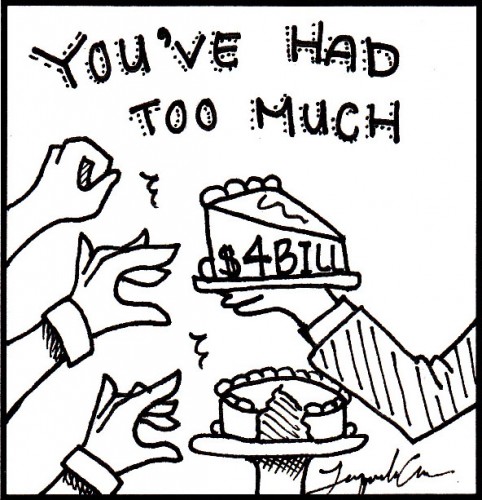Immoral Cuts from Food Stamp Program May Be Imminent
JANET GUAN
Staff Writer
House Representatives, mainly Republicans, recently approved a $40 billion cut in the government food stamp program. However, if the cuts are implemented, they can withdraw much needed monetary support from thousands of families.
The purpose of the Republican plan is to reduce citizens’ economic dependence on the government. Yet, a general cut from the budget does not counter the problem effectively. Some beneficiaries of the program do blatantly misuse the program. A prime example would be Jason Greenslate, an able-bodied, unemployed surfer who buys lobster and sushi with the food stamps instead of necessary groceries. However, abusers of the program make up a minimal portion of the whole group. A general cut from the budget will not do much in eliminating misusers from the program since on a monetary standpoint, they are in the same circumstances as those who need support. Cutting money from the budget means indiscriminately taking off those who do need the program. Multiple Democrats argue that seniors, active duty military families and children are at risk of losing support if the cut is implemented. Citizens that need the most monetary support should not be denied help if they truly need the aid.
The logic behind cutting money from food stamps is not sound. Why cut from a program that helps keep multiple families and individuals fed adequately? There was a significant increase of food stamp users after the recession and the economy still has not fully recovered. Many are out of jobs and need monetary support to keep themselves and their families nourished. Cutting $40 billion from the budget per decade levels out to nearly four billion per year– five percent of the $75.7 billion food stamp budget. According to Demonocracy, the average amount of money in an Electronic Benefits Transfer (EBT) card is $275 per month. Cuts will result in more than two hundred thousand applicants not receiving monetary support, or a significant decrease in the money distributed per beneficiary.
Instead of taking away money from programs that benefit citizens, unnecessary spending should be limited. Multiple branches of government have been detected spending government money on activities that do not benefit citizens and losing thousands or even millions of dollars in overpaying certain institutions and being subject to fraud. The US Secret Service spent $23 million to purchase luxury parade limousines. Would it be sensible for a parent to take away lunch money from their child yet spend money on a luxury car?
So far, only the House of Representatives has approved the bill. The Senate, and possibly the President, will further consider the bill. The Senate should further consider SNAP participants who will be placed at a disadvantage with the large cut.
